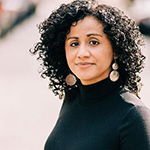Boondocks:
~
from the Tagalog bundók & Cebuano bukid:
each meaning mountain, rurality, folded-up
land far from ocean, from Proto-Austronesian
bunduk: higher ground. When American
soldiers menaced the Philippines after
the nation declared independence from Spain,
Filipinos used bundók as cover, descending
on an army used to prairies, to brown faces
protecting sacred ground raging across
open field instead of behind trees raining
fire down the bundóks. Those soldiers
birthed the bastard word “boondocks”
in these mountains, migrating meaning
toward remote country, hinterlands
where the people, in their estimation
(and what is the estimation of a nineteen-
year-old American boy worth?), were less
civilized or civil. I imagined a boondock
being watery wasteland and didn’t expect
it to mean “mountain” in my stepfather’s
first tongue or in Cebuano, Cebu being part
of the archipelago I know well from my time
with church folk who proselytized to the choir,
molding Protestants from Catholics, but also
running clinics, providing materials to teachers,
giving teens community, inviting young trans
women to hang out, delight in sisterly love. I met
my first out trans friend in Cebu at fifteen;
she taught me the Cebuano word
for cockroach as a gag: uk-ok. Bakla
is Cebuano for gay man and transwoman.
bakla bukid beauty bundók
~
Jennifer Laude was a bakla, Filipina beauty
murdered by American marine in a bathroom
stall because his own desire was distasteful
to him. He could not understand the forests
of her bundóks. The murderer was released
after five years of a ten-year sentence. He—
and I don’t bother naming the man from
the boondocks because names are themselves
honorifics—had AC in his cell, was paid a quarter
of a million dollars while he twiddled the thumbs
that held Jennifer’s head in a toilet. The US military
will remain in the Philippines in exchange for vaccines.
~
Babaylan: from the Austronesian balian—
a word for shaman from the pre-colonial
Philippines. A babaylan was almost always
a woman like Jennifer: shamans by nature,
guided by spirits of ancestors who brought
them back to their bodies after traveling
to astral boondocks until colonizers drove
them into the mountains. I wish a medium
beyond words to guide Jennifer back to her
body. I wish an army of bakla babaylan:
beautiful, fearless, thundering down the
bundóks, fire streaming from their painted lips.

Amy M. Alvarez is a Black Latina poet, educator, and scholar. Her work focuses on race, ethnicity, gender, regionality, nationality, and social justice. She has been awarded fellowships from CantoMundo, VONA, Macondo, VCCA, and the Furious Flower Poetry Center. Her poetry has appeared or is forthcoming in Ploughshares, New Ohio Review, River Styx, Colorado Review, Crazyhorse, Alaska Quarterly Review, and elsewhere. Born in New York City to Jamaican and Puerto Rican parents, she now lives in Morgantown, West Virginia, and teaches at West Virginia University.

 BACK TO ISSUE
BACK TO ISSUE